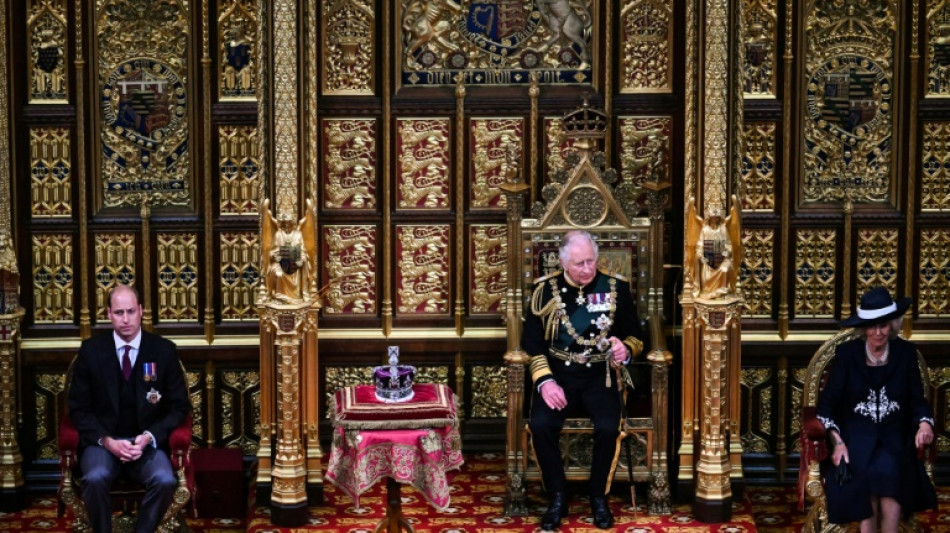
CMSC
-0.0200


Head of state Queen Elizabeth II missed Tuesday's ceremonial opening of the UK parliament for the first time in nearly 60 years, handing the duty to her heir Prince Charles in a clear sign of the looming transition of power.
The 96-year-old monarch usually presides over the pomp-filled event and reads out her government's legislative programme from a gilded throne in the House of Lords.
But Buckingham Palace said late Monday she would skip the annual showpiece on medical advice, making the decision "reluctantly" as she continues to experience "episodic mobility problems".
It is the latest in a string of cancelled public appearances caused by health problems and old age indicating her record-breaking 70-year reign is drawing to a close.
Charles, the Prince of Wales, was accompanied at the high-profile state engagement by his eldest son, Prince William, who is second-in-line to the throne.
William, the Duke of Cambridge, arrived ahead of his father, wearing a morning suit and military medals as he was escorted through parliament.
Charles, wearing full military regalia, waved to crowds as he made his way by car to the Palace of Westminster with wife Camilla, Duchess of Cornwall.
The national anthem, "God Save the Queen", played as he arrived at parliament, before a royal trumpet fanfare struck up as he stepped out of the vehicle.
The royal procession entered the House of Lords behind the imperial state crown -- usually worn by the queen -- which was carried into the chamber on a cushion before being placed on a small table.
Charles delivered the Queen's Speech from the consort's throne, symbolically an inch shorter than the monarch's sovereign throne, and was flanked by his wife and son as he read out the government's agenda.
- 'Historic moment' -
The queen has rarely been seen in public since spending an unscheduled night in hospital last October, and has complained of difficulties standing and walking. She also contracted Covid-19 in February.
She has missed only two state openings -- in 1959 and 1963, when she was pregnant with Prince Andrew and then Prince Edward.
Her decision heightened fears that she may not be able to play a full part in public celebrations next month celebrating her Platinum Jubilee.
Royal expert Robert Hardman wrote in the Daily Mail that the queen "remains very much in charge" but called the handover a "historic moment".
The Times wrote that for Charles -- the longest-serving heir to the throne in British history -- this is "the nearest he has come to performing the duties he will one day undertake as king".
It is William's first time attending the state opening, in another clear sign of the family preparing for a future beyond Elizabeth and Charles.
The queen announced last week she will not attend this summer's royal garden parties, and has only appeared once in public since October -- at the March 29 memorial service for her late husband Prince Philip, who died last year aged 99.
- 'Back on track' -
The queen's absence overshadowed the start of the new parliamentary session in which Prime Minister Boris Johnson will try to reinvigorate his faltering government by unveiling its plans for the coming year.
Reeling from a series of scandals and dire results for his ruling Conservatives in local elections last week, he is promising 38 bills to get his agenda "back on track", Downing Street said.
The plan is focussed on boosting economic growth and paving the way for more "high-wage, high-skill jobs", as well as tackling the spiralling cost of living.
The upcoming parliamentary session -- the current government's third -- is one of Johnson's last opportunities to deliver on his key policy promises before the next general election due by May 2024.
Johnson won an 80-seat majority in December 2019, vowing to reap rewards from Brexit and tackle decades of growing regional inequality.
Despite securing Britain's withdrawal from the EU with a comprehensive trade deal, the coronavirus pandemic upended delivery of his domestic agenda.
His government was soon consumed by the pandemic and then sidetracked in recent months by various controversies, including the so-called "Partygate" scandal.
He is now hoping his legislative programme can help draw a line under his recent woes.
But he faces a daunting challenge as the growing cost-of-living crisis begins to bite, with bleak economic forecasts.
G.Dominguez--TFWP